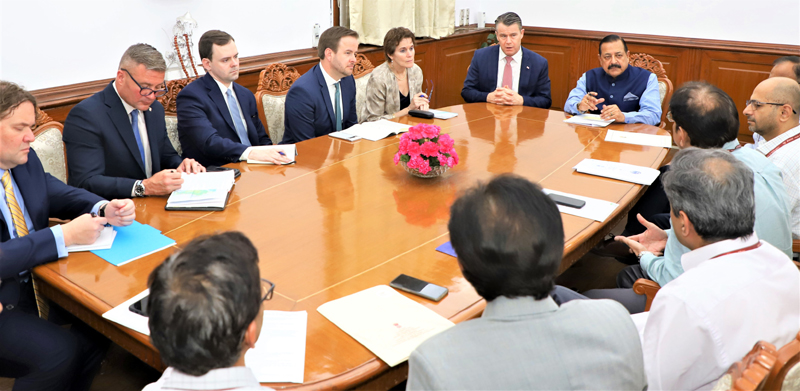
Excelsior Correspondent
NEW DELHI, Apr 14: A high level US delegation, led by US Senator Todd Young, called on Union Minister of State (Independent Charge) Science & Technology; Minister of State (Independent Charge) Earth Sciences; MoS PMO, Personnel, Public Grievances, Pensions, Atomic Energy and Space, Dr Jitendra Singh and sought deeper bilateral cooperation with India in wide range of areas like Artificial Intelligence (AI), Quantum, Cyber Security, Semiconductor, Clean Energy, Advanced Wireless, Biotechnology, Geosciences, Astrophysics and Defence, etc.
Dr Jitendra Singh told the US Delegation that Prime Minister Narendra Modi, in the last 9 years, took personal interest in Science, Technology and Innovation, and tried pro-actively to implement social sector schemes through science based solutions to bring Ease of Living for the common man.
The Minister said, the patronage received from Modi has opened new opportunities and possibilities in all areas of scientific endeavours, but more so in areas of Space, Biotech, Geospatial and Sustainable StartUps. He pointed out that since 2014, in every Independence Day speech, PM Modi has flagged key scientific challenges and projects like Cleanliness, Hydrogen Mission, Digital Health Care system, Deep Ocean Mission, Clean Energy and StartUps.
Senator Todd Young suggested scaling up collaboration and exploring opportunities to partner in quantum technology, ocean science, nuclear energy, semiconductors, supercomputing and other latest emerging technologies.
An official from the Department of Science and Technology informed the Minister that a total of 35 joint projects have been identified which will be implemented by the Technology Innovation Hubs (TIHs) and research institutions from the USA. Six TIHs under NM-ICPS have been identified for collaborative research and development with NSF-supported institutions. The Hubs are part of a five-year, nearly $430 million investment by DST under the National Mission on Interdisciplinary Cyber-Physical Systems and comprise academic researchers and industry partners.
Additionally, the Indo-U.S. joint clean Energy R&D programme is a joint initiative of the Ministry of Science and Technology, Govt. of India and the U.S. Department of Energy which has been ongoing.
Senator Todd Young informed that the US looks forward to a greater synergy and collaboration between the DST launched Technology Innovation Hubs and National Science Foundation as NSF has a foundation of academic expertise and core commercial competencies.
Talking about another area of collaboration, Dr Jitendra Singh said that he was happy to inform that the Union Cabinet has approved the LIGO-India project to build an advanced gravitational-wave detector in Maharashtra at an estimated cost of Rs 2,600 crore. The facility’s construction is expected to be completed by 2030. The observatory will be the third of its kind, made to the exact specifications of the twin Laser Interferometer Gravitational-wave Observatories (LIGO), in Louisiana and Washington in the U.S. LIGO-India will work in tandem with them. The Minister and the Senator were also informed about five potential areas of collaboration between Geological Survey of India and United States Geological Survey for setting in place an MoU.
Prof. Ajay Kumar Sood, Principal Scientific Adviser (PSA) to the Government of India and other senior functionaries of the Department of S&T and Department of Atomic Energy joined the meeting.

